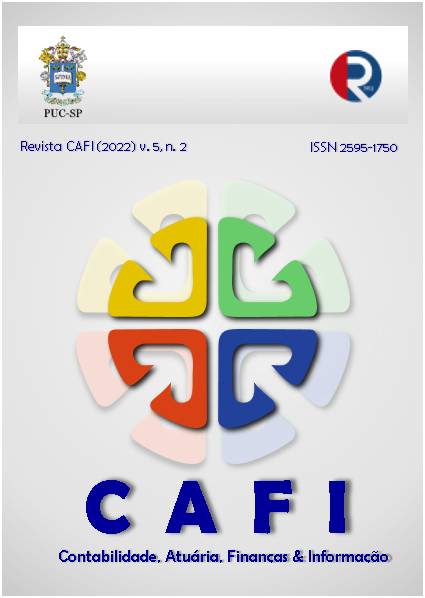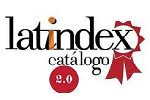Análise do reconhecimento contábil do incentivo fiscal oriundo da adesão ao “Programa Rota 2030 – Mobilidade e Logística”
DOI:
https://doi.org/10.23925/cafi.v5i2.57024Palavras-chave:
Programa Rota 2030 - Mobilidade e Logística, Incentivos fiscais, Pesquisa e Desenvolvimento, Subvenções GovernamentaisResumo
A indústria automotiva brasileira iniciou o ano de 2018 com uma grande dúvida: “O programa Rota 2030 – Mobilidade e Logística será aprovado?”. As discussões ocorreram durante todo o ano até que no dia 10 de dezembro de 2018 foi aprovada a Lei nº 13.755, que concede as empresas habilitadas, uma série de benefícios fiscais, com contrapartida em investimentos em Pesquisa e Desenvolvimento (P&D). Neste contexto, o presente artigo teve por objetivo avaliar se as empresas habilitadas ao programa têm adotado o mesmo tratamento contábil para reconhecimento e divulgação dos créditos tributários oriundos do programa Rota 2030. Trata-se de um estudo qualitativo, descritivo, cujos dados foram extraídos de entrevistas realizadas com os gestores de empresas do setor automotivo. O perfil selecionado de cada empresa visa estabelecer um confronto entre modelos de negócios, tamanho e público-alvo, a fim de se determinar se tais características foram relevantes na tomada de decisão de qual tratamento contábil utilizar. Com isso, foi possível observar que não há unanimidade nessa escolha, onde parte das empresas entrevistadas, utilizam uma contabilização distinta das demais. O resultado do estudo também demonstrou que, pelo fato de o montante gerado de créditos tributários implicar em indicadores patrimoniais e de resultado, e que podem determinar, inclusive, a permanência da empresa no programa Rota 2030, a escolha pelo tratamento contábil se torna relevante no processo de tomada de decisão e análise de resultados.
Referências
Araújo, T. S., Souza, F. Ê. A., & Lemes, S. (2015). O impacto das escolhas contábeis na comparabilidade das demonstrações financeiras de companhias abertas com programa de fidelização de clientes. REUNIR - Revista De Administração Contabilidade E Sustentabilidade. Recuperado em julho de 2020 de http://reunir.revistas.ufcg.edu.br/index.php/uacc/article/view/273 =
Bragança, C. G., & Melillo, P. H. (2017). Escolhas contábeis e gerenciamento de resultados: um estudo de caso sobre o reconhecimento de subvenções governamentais em um hospital filantrópico. In Anais do Congresso Brasileiro de Custos-ABC. Recuperado em julho de 2020 de https://anaiscbc.emnuvens.com.br/anais/article/view/4353
Brasil. Instrução normativa, SRF nº 11, de 21 de fevereiro de 1996. (1996, 22 de fevereiro). Dispõe sobre a apuração do imposto de renda e da contribuição social sobre o lucro das pessoas jurídicas. Recuperado de http://normas.receita.fazenda.gov.br/sijut2consulta/link.action?visao=anotado&idAto=13034
Brasil. Lei n. 13.755, de 10 de dezembro de 2018. (2019, 19 de junho). Estabelece requisitos obrigatórios para a comercialização de veículos no Brasil; institui o Programa Rota 2030 - Mobilidade e Logística; dispõe sobre o regime tributário de autopeças não produzidas. Recuperado de http://www.planalto.gov.br/ccivil_03/_Ato2015-2018/2018/Lei/L13755.htm
Brasil. Medida provisória n 843, de 6 de julho de 2018. (2018, 6 de julho). Estabelece requisitos obrigatórios para a comercialização de veículos no Brasil, institui o Programa Rota 2030 - Mobilidade e Logística e dispõe sobre o regime tributário de autopeças não produzidas. Recuperado de https://www.congressonacional.leg.br/materias/medidas-provisorias/-/mpv/133866
Comitê de Pronunciamentos Contábeis CPC. (2010). Pronunciamento técnico CPC 04 - Ativo intangível. Recuperado em junho de 2020 de http://www.cpc.org.br/CPC/Documentos-Emitidos/Pronunciamentos/Pronunciamento?Id=35
Comitê de Pronunciamentos Contábeis CPC. (2010). Pronunciamento técnico CPC 07 - Subvenção e Assistência Governamentais. Recuperado em julho de 2020 de http://www.cpc.org.br/CPC/Documentos- Emitidos/Pronunciamentos/Pronunciamento?Id=38
Comitê de Pronunciamentos Contábeis CPC. (2009). Pronunciamento técnico CPC 16 - Estoques. Recuperado em julho de 2020 de http://www.cpc.org.br/CPC/Documentos-Emitidos/Pronunciamentos/Pronunciamento?Id=47
Comitê de Pronunciamentos Contábeis CPC. (2009). Pronunciamento técnico CPC 32 - Tributos sobre o Lucro. Recuperado em julho de 2020 de http://www.cpc.org.br/CPC/Documentos-Emitidos/Pronunciamentos/Pronunciamento?Id=63
Isto é dinheiro. (2018). Rota 2030 prevê 15 anos para compensar créditos. Recuperado em julho de 2020 de https://www.istoedinheiro.com.br/rota-2030-preve-15-anos-para-compensar-creditos/
Franco, D. A. P. J.; Silva, M. B. M. S.; Souza, M. R. C.; Gonzales, A. (2020). Incentivos fiscais para comercialização de veículos no Brasil Programa ROTA 2030. CAFI - Contabilidade, Atuária, Finanças & Informação. Recuperado em julho de 2020 de https://revistas.pucsp.br/CAFI/article/view/46511/32472
Lima, M. J e Guardia, E. R. (2018). EMI nª 00028/2018 MDIC MF. Recuperado em julho de 2020 de http://www.planalto.gov.br/ccivil_03/_ato2015-2018/2018/Exm/Exm-MP-843-18.pdf
Ministério da Fazenda e da Indústria, Comércio Exterior e Serviços - MDIC. Recuperado de http://www.mdic.gov.br/index.php/competitividade-industrial/setor-automotivo/regime-de-autopecas-nao-produzidas
Roa, Ricardo. (2019). Incertezas impedem adesão de empresas ao Rota 2030. Automotive Business. Recuperado em julho de 2020 de http://automotivebusiness.com.br/artigo/1786/incertezas-impedem-adesao-de-empresas-ao-rota-2030
Scheren, G., Dalchiavon, A., & Moura, G. D. (2018). Influência da governança corporativa para o recebimento de subvenções e assistências governamentais em companhias abertas. Revista de Governança Corporativa. Recuperado em julho de 2020 de http://www.rgc.org.br/ojs1/index.php/rgc/article/view/50/pdf_15
Silva, Jessica. (2018). Com Rota 2030, montadoras terão que investir R$ 5 bilhões por ano. Diário do Transporte. Recuperado em julho de 2020 de https://diariodotransporte.com.br/2018/05/16/com-rota-2030-montadoras-terao-que-investir-r-5-bilhoes-por-ano/
Downloads
Publicado
Como Citar
Edição
Seção
Licença
Copyright (c) 2022 CAFI

Este trabalho está licenciado sob uma licença Creative Commons Attribution 4.0 International License.
Declaração de Direito Autoral
Autores mantém os direitos autorais e concedem à revista o direito de primeira publicação, com o trabalho simultaneamente licenciado sob a Licença Creative Commons Attribution que permite o compartilhamento do trabalho com reconhecimento da autoria e publicação inicial nesta revista.
Declaração de Privacidade
Os nomes e endereços informados nesta revista serão usados exclusivamente para os serviços prestados por esta publicação, não sendo disponibilizados para outras finalidades ou a terceiros.









